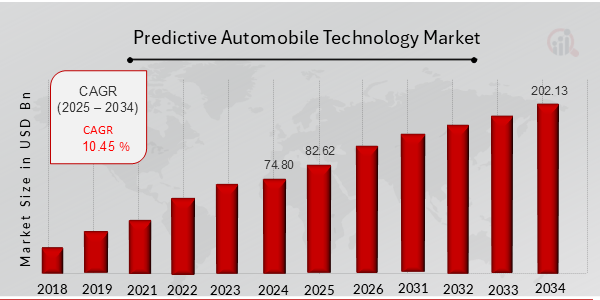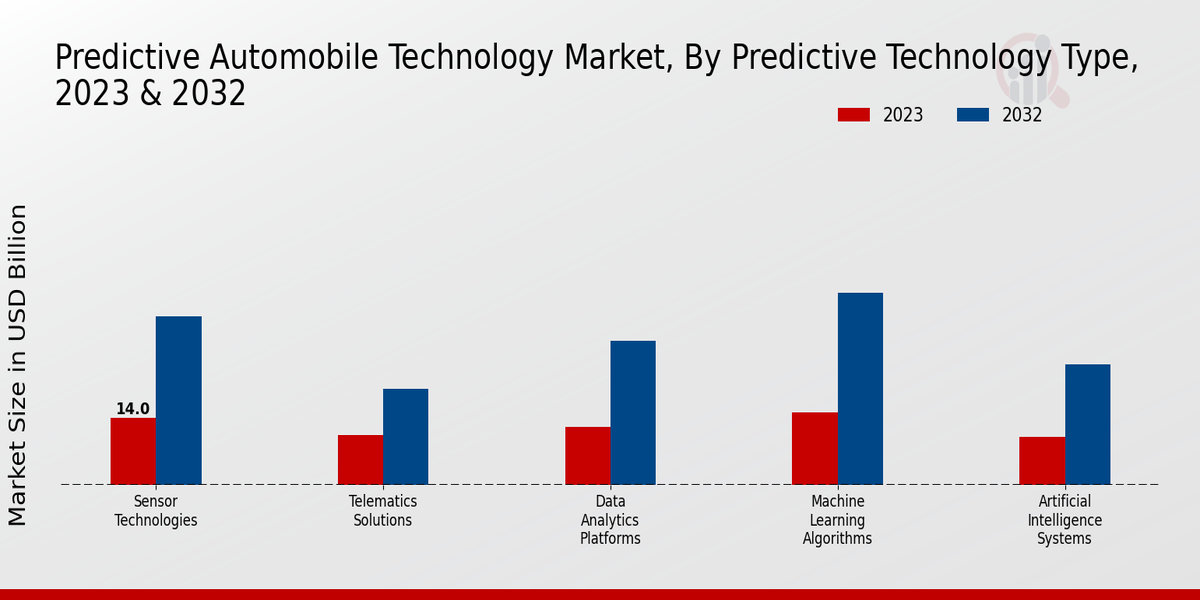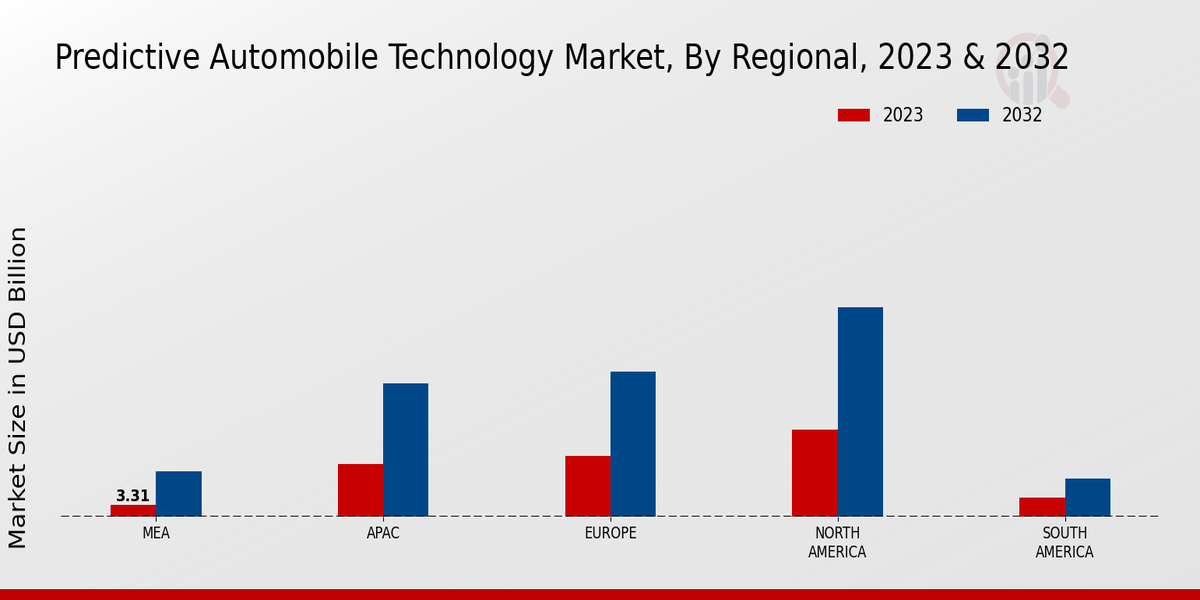Global Predictive Automobile Technology Market Overview
As per MRFR analysis, the Predictive Automobile Technology Market Size was estimated at 74.80 (USD Billion) in 2024. The Predictive Automobile Technology Market Industry is expected to grow from 82.62 (USD Billion) in 2025 to 202.13 (USD Billion) till 2034, at a CAGR (growth rate) is expected to be around 10.45% during the forecast period (2025 - 2034)
Key Predictive Automobile Technology Market Trends Highlighted
The Predictive Automobile Technology Market is significantly driven by the increasing demand for enhanced vehicle safety and efficiency. As consumers become more aware of safety features, automakers are leveraging predictive analytics to minimize accidents and improve driver assistance systems. The integration of artificial intelligence and machine learning into vehicle systems not only aids in real-time decision-making but also optimizes maintenance schedules by forecasting potential malfunctions before they occur. This proactive approach to vehicle management is reshaping the industry, making automobiles smarter and more reliable.
There are ample opportunities to be explored within the predictive automobile technology landscape. With the rapid advancement of connected and autonomous vehicles, companies can capitalize on the demand for advanced driver-assistance systems (ADAS) and IoT-enabled features. The evolving regulatory environment surrounding vehicle emissions and safety standards also offers a fertile ground for innovation, encouraging collaboration between tech firms and automotive manufacturers. By harnessing big data analytics and cloud computing, stakeholders can unlock new business models and enhance customer experiences, thus maintaining a competitive edge.
In recent times, notable trends have emerged, emphasizing the shift towards electric and hybrid vehicles, which are increasingly equipped with predictive features. Consumers are now seeking vehicles that account for environmental sustainability alongside advanced technology. Additionally, the rise of shared mobility services has spurred investments in predictive analytics to optimize fleet management and improve operational efficiency. With the convergence of technology and transportation, the focus has shifted towards creating a seamless driving experience, signaling a transformative era for the Predictive Automobile Technology Market.

Source: Primary Research, Secondary Research, Market Research Future Database and Analyst Review
Predictive Automobile Technology Market Drivers
Increasing Demand for Advanced Safety Features
The Predictive Automobile Technology Market industry is witnessing a significant surge in demand for advanced safety features in vehicles. As automotive safety becomes a crucial factor for consumers, manufacturers are increasingly integrating predictive technology to enhance the safety and security of their vehicles. This trend is driven by a growing awareness among consumers regarding road safety and a rising number of road accidents. Predictive technologies, including advanced driver-assistance systems (ADAS) and collision avoidance systems, play a key role in reducing the likelihood of accidents.
The implementation of such technologies not only enhances user confidence and satisfaction but also complies with stringent government regulations focused on improving vehicle safety standards. As a result, the demand for predictive automobile technology continues to grow, providing manufacturers with a competitive edge and driving innovation in the market. Furthermore, the increased adoption of these advanced safety features is not limited to premium vehicles; it is also being extended to mid-range and compact cars, expanding the market reach and driving the overall growth of the Predictive Automobile Technology Market industry.
Integration of AI and Machine Learning
The integration of artificial intelligence (AI) and machine learning technologies is rapidly transforming the Predictive Automobile Technology Market industry. By utilizing these advanced technologies, automotive manufacturers can optimize vehicle performance and enhance the driving experience. AI-driven predictive analytics allows for real-time data processing, providing insights that improve vehicle safety, efficiency, and reliability. As consumers increasingly seek smarter and more connected vehicles, the demand for AI-enhanced predictive technologies continues to rise.This growing trend supports the advancement of automated driving, navigation systems, and other features, contributing to the market's expansion.
Growing Adoption of Electric and Autonomous Vehicles
The increasing adoption of electric and autonomous vehicles is a significant driver for the Predictive Automobile Technology Market industry. As the automotive landscape shifts toward sustainability and innovation, electric and autonomous vehicles require advanced predictive technologies to enhance their functionality and user experience. This transition is heavily influenced by government initiatives and environmental regulations promoting electric vehicles alongside technological advancements that facilitate the development of autonomous systems.As a result, predictive technology becomes crucial for optimizing performance, managing battery life, and ensuring safe navigation in autonomous vehicles.
The integration of these technologies not only improves the overall efficiency of electric vehicles but also supports their widespread acceptance in the market.
Predictive Automobile Technology Market Segment Insights
Predictive Automobile Technology Market Predictive Technology Type Insights
The Predictive Automobile Technology Market has shown significant evolution within the Predictive Technology Type segment, which includes essential categories such as Machine Learning Algorithms, Data Analytics Platforms, Artificial Intelligence Systems, Sensor Technologies, and Telematics Solutions. In 2023, the overall market is valued at 61.31 USD Billion, with the market showing a robust growth trajectory leading towards 150.0 USD Billion by 2032.
The growing need for improved decision-making systems in the automobile sector greatly enhances the importance of Machine Learning Algorithms, which is one of the dominant players, indexed at a value of 15.0 USD Billion in 2023 and projected to reach 40.0 USD Billion by 2032. This substantial market presence indicates its capability to perform predictive analytics and optimize various automobile processes, ultimately contributing to enhanced driving safety and efficiency.
Further contributing to the landscape, Data Analytics Platforms are projected to grow from 12.0 USD Billion in 2023 to 30.0 USD Billion by 2032. This platform's significance stems from its ability to process large batches of data, making sense of historical patterns and aiding manufacturers in real-time decision-making. Meanwhile, the importance of Sensor Technologies is underscored by its current valuation of 14.0 USD Billion, with expectations of rising to 35.0 USD Billion by 2032, showcasing its role in vehicle safety through environmental monitoring and system alerts, thus directly impacting automobile safety features.
Telematics Solutions, valued at 10.31 USD Billion in 2023 and expected to grow to 20.0 USD Billion by 2032, plays an essential role in the Predictive Automobile Technology Market by enabling GPS tracking, vehicle health diagnostics, and efficient route planning, which, in the current era of smart cars, are pivotal for enhancing user experience and overall vehicle performance.
On the other hand, Artificial Intelligence Systems, starting at 10.0 USD Billion and projected to grow to 25.0 USD Billion by 2032, contribute significantly by automating processes and providing dynamic interaction between the vehicle systems and users, thus creating a smarter driving environment.
Together, these segments highlight how the Predictive Automobile Technology Market segmentation is increasingly adopting progressive technologies, with each segment demonstrating its own impact on market growth while collectively advancing the automotive industry's innovative capabilities. The ongoing shift towards data-driven practices is expected to define future advancements and reshape the competitive landscape as traditional automotive methodologies transform into data-centric, predictive strategies. The future growth prospects are promising, with trends leaning towards increased automation, smart integrations, and amplified user safety, all vital components for driving the evolution of predictive technology within the automotive realm.

Source: Primary Research, Secondary Research, Market Research Future Database and Analyst Review
Predictive Automobile Technology Market Application Domain Insights
The Predictive Automobile Technology Market, valued at 61.31 USD Billion in 2023, is witnessing significant advancements within the Application Domain segment. This segment encompasses critical areas like Traffic Management, Vehicle Maintenance, Driver Behavior Analysis, Predictive Insurance, and Fleet Management. Traffic Management plays a vital role in optimizing road usage and reducing congestion, leading to improved overall efficiency. Vehicle Maintenance is crucial for extending the lifespan of vehicles by anticipating repairs and minimizing breakdowns.
Driver Behavior Analysis contributes significantly to ensuring safety and enhancing driving habits, which is key for insurance and risk assessment. Predictive Insurance leverages data analytics for tailored policies, addressing individual risk profiles effectively. Fleet Management is a dominant area, optimizing fleet operations and enhancing productivity through data-driven insights. The increasing demand for these applications reflects the growing importance of real-time data in enhancing safety, efficiency, and cost-effectiveness across the Predictive Automobile Technology Market industry, supported by favorable trends and technological innovations driving market growth.
Predictive Automobile Technology Market Automotive Segment Insights
The Predictive Automobile Technology Market has shown significant growth and dynamism, with a market valuation reaching 61.31 USD Billion in 2023. This market is characterized by diverse applications in various vehicle types, including Passenger Vehicles, Commercial Vehicles, Electric Vehicles, Luxury Vehicles, and Autonomous Vehicles. Passenger Vehicles are recognized for their substantial share and adaptability, driven by increasing consumer demand for safety features and connectivity. Meanwhile, Electric Vehicles are gaining traction as environmental consciousness rises, highlighting their potential for technology integration that enhances performance and efficiency.
Commercial Vehicles play a crucial role due to their impact on logistics and freight operations, where predictive technology enhances operational efficiency and reduces downtime. The Luxury Vehicles segment capitalizes on advanced features that cater to affluent consumers seeking exclusivity and innovation. Autonomous Vehicles dominate discussions around the future of transportation, given their potential to transform mobility and reduce accidents. In this evolving landscape, trends such as smart connectivity, the shift towards sustainability, and the rising integration of artificial intelligence are paramount for driving the Predictive Automobile Technology Market data, creating both opportunities and challenges across the industry.
Predictive Automobile Technology Market Functionality Insights
The Predictive Automobile Technology Market, valued at 61.31 USD Billion in 2023, showcases a robust focus on functionality, significantly shaping the industry landscape. Within this framework, functionalities such as Predictive Maintenance, Real-Time Monitoring, Driver Assistance, Load Forecasting, and Route Optimization play pivotal roles. Predictive Maintenance has emerged as a central feature, reducing downtime and maintenance costs, which resonates with operators looking to enhance operational efficiency. Real-Time Monitoring systems dominate in offering immediate insights into vehicle performance and safety, ultimately improving driver experience.
Driver Assistance technology stands out, enhancing safety and navigation, thus addressing the growing consumer demand for reliability. Load Forecasting is becoming increasingly significant due to its potential for optimizing logistics and improving fuel efficiency. However, competition and technological advancements present challenges, necessitating continuous innovation. Overall, the Predictive Automobile Technology Market data reflects an industry poised for growth, underscoring the importance of these functionalities in driving market momentum and addressing evolving consumer needs.
Predictive Automobile Technology Market Regional Insights
The Predictive Automobile Technology Market is witnessing significant growth across various regions, with North America holding the majority as the market was valued at 23.0 USD Billion in 2023 and is expected to grow substantially. Europe also plays a crucial role, demonstrating notable market performance, valued at 16.0 USD Billion in 2023. The Asia Pacific region shows promising potential, with its valuation at 14.0 USD Billion, indicating an increasing adoption of advanced automotive technologies. Meanwhile, the Middle East and Africa segment, valued at 3.31 USD Billion, is gradually emerging, reflecting growing interest in predictive technologies in the automotive sector.
South America accounts for a smaller portion with a valuation of 5.0 USD Billion, but it remains significant in exploring future avenues for growth. The differing values across these regions highlight regional disparities in technology adoption, consumer demand, and infrastructure readiness, making the Predictive Automobile Technology Market statistics essential for understanding market dynamics. Each region's distinct characteristics contribute to the overall market growth, driven by factors like evolving automotive trends, regulatory frameworks, and investment in smart technologies.

Source: Primary Research, Secondary Research, Market Research Future Database and Analyst Review
Predictive Automobile Technology Market Key Players And Competitive Insights
The Predictive Automobile Technology Market is rapidly evolving, driven by advancements in artificial intelligence and machine learning that enhance vehicle performance and safety. Competitive insights within this market reflect a landscape characterized by a strong focus on innovation, collaboration, and strategic partnerships among key players. These companies continuously optimize their technologies to develop predictive capabilities that forecast vehicle behavior, maintenance needs, and driver preferences.
As the market grows, the integration of Internet of Things devices and cloud-based solutions further influences competitive dynamics, offering an array of opportunities for market players to establish leadership positions and capture emerging trends in predictive analytics for the automotive sector.
Microsoft has established a formidable presence in the Predictive Automobile Technology Market through its robust cloud infrastructure and an extensive array of AI services. The company leverages its Azure cloud platform to support automotive manufacturers and suppliers in harnessing predictive analytics for vehicle lifecycle management and real-time data processing. Microsoft’s strengths lie in its ability to facilitate seamless integration of vehicle systems with cloud technology, enabling manufacturers to utilize data-driven insights for enhancing operational efficiency and customer experiences.
Moreover, Microsoft’s partnerships with automotive ecosystem leaders empower it to deliver comprehensive solutions that address complex challenges faced by the industry, which enhances its competitiveness in the predictive automobile technology realm.Volvo has carved out a significant role in the Predictive Automobile Technology Market, particularly through its commitment to safety and innovation. The company integrates predictive technology within its vehicles to anticipate potential hazards and improve driving conditions, showcasing its focus on delivering enhanced safety features. Volvo’s strengths include its renowned expertise in vehicle safety systems and an unwavering dedication to improving the driver experience through predictive maintenance technologies.
Furthermore, by investing in research and collaborating with technology firms, Volvo consistently enhances its predictive capabilities to stay ahead in a competitive landscape, ensuring that it provides not just vehicles but intelligent driving solutions that align with the future of automobile travel.
Key Companies in the Predictive Automobile Technology Market Include
Predictive Automobile Technology Market Industry Developments
-
Q1 2025: CES 2025 Provides Look at Future Trends in Automotive Technology At CES 2025, VinAI showcased new AI-powered predictive automotive technologies including DrunkSense (drunk driving detection), MirrorSense (automatic mirror adjustment), and Touch2Park (Level 2 smart parking), as well as advanced driver monitoring and 360° surround view systems. VinAI reported its technologies have been integrated into over 80,000 vehicles globally, with plans to reach 800,000 vehicles in five years.
Predictive Automobile Technology Market Segmentation Insights
-
Predictive Automobile Technology Market Predictive Technology Type Outlook
- Machine Learning Algorithms
- Artificial Intelligence Systems
-
Predictive Automobile Technology Market Application Domain Outlook
-
Predictive Automobile Technology Market Automotive Segment Outlook
-
Predictive Automobile Technology Market Functionality Outlook
-
Predictive Automobile Technology Market Regional Outlook
| Report Attribute/Metric |
Details |
|
Market Size 2024
|
74.80 (USD Billion)
|
|
Market Size 2025
|
82.62 (USD Billion)
|
|
Market Size 2034
|
202.13 (USD Billion)
|
|
Compound Annual Growth Rate (CAGR)
|
10.45% (2025 - 2034)
|
|
Report Coverage
|
Revenue Forecast, Competitive Landscape, Growth Factors, and Trends
|
|
Base Year
|
2024
|
|
Market Forecast Period
|
2025 - 2034
|
|
Historical Data
|
2019 - 2023
|
| Market Forecast Units |
USD Billion |
| Key Companies Profiled |
Microsoft, Volvo, Robert Bosch, Toyota, NVIDIA, Siemens, SAP, Daimler, IBM, Continental, Ford, General Motors, Google, Intel, Tesla |
| Segments Covered |
Predictive Technology Type, Application Domain, Automotive Segment, Functionality, Regional |
| Key Market Opportunities |
Enhanced driver safety features Advanced AI algorithms integration Expansion in electric vehicles sector Growing demand for autonomous driving Realtime data analytics solutions. |
| Key Market Dynamics |
Technological advancements Increasing safety regulations Rising consumer demand Enhanced user experience Growth in electric vehicles |
| Countries Covered |
North America, Europe, APAC, South America, MEA |
Frequently Asked Questions (FAQ):
The Predictive Automobile Technology Market is expected to be valued at 150.0 USD Billion by 2032.
The expected CAGR for the Predictive Automobile Technology Market is 10.45% from 2024 to 2032.
North America is projected to have the largest market share, expected to reach 55.0 USD Billion by 2032.
The Machine Learning Algorithms segment is anticipated to be valued at 40.0 USD Billion by 2032.
The Data Analytics Platforms segment is expected to grow, reaching 30.0 USD Billion by 2032.
Major players include Microsoft, Volvo, Robert Bosch, and Toyota, among others.
The Sensor Technologies segment is expected to be valued at 35.0 USD Billion by 2032.
The APAC region is anticipated to grow to 35.0 USD Billion by 2032.
The Telematics Solutions segment is projected to be valued at 20.0 USD Billion by 2032.
The MEA region is expected to reach a market size of 12.0 USD Billion by 2032.

















